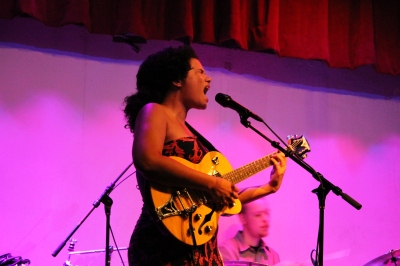Summary:
Station agents often wrongfully call police on performers. If police tell you they were called by a station agent, or simply that they “got a call,” you can assert your right to perform. But also, you have the option of reporting the station agent. To do so, record the number on the badge displayed in the booth window. Then, call 511 and leave a clear complaint stating what occurred. The MTA will follow up with you by mail to consult about retraining — and you have created an official record that will protect future buskers in that station.
Are station agents ever responsible for the arrival of the police? And can we effect change by working with the MTA to address harassment that arises from station agents’ misunderstandings of the rules? That’s a question that most of us don’t think to ask — and indeed, it seems that the police most often get involved with performers of their own accord, when they really should be doing other things.
However, it may be that station agents do request police interventions more often than we realize. After all, when the police throw you out, you have to get right out — which precludes going to the booth to find out from the station agent if there were factually any concerns about noise or traffic. (It also keeps you from filing any complaints, and we’ve written before about being ejected precludes any documentation of the harassment). So really, a performer who’s ejected has no way to know if a complaint was made by the station agent at all, unless he or she risks arrest by disobeying an officer’s order to stay out.
I had the rare opportunity to find out directly about a station agent’s involvement on August 1. As I wrote in a post about that incident, I showed the officers a copy of the rules, and after reading them, they agreed that there was no reason for me to cease the performance.
I haven’t yet shared information about the next part. Once the officers had left, I went to the station agent and asked if she knew why the police had come. To my considerable surprise, she told me right up front that she had called them, apparently in response to a customer complaint. “And you know that performing here is legal?” I asked. “Well, I had to call, because it was a customer complaint,” she replied. I found this a bit unsatisfactory, and asked her if she would call the police if told by a customer that there was a train in the train station. She replied that she wouldn’t, but that she did feel obliged to call to report a musician.
I didn’t find that answer acceptable. So, I took down her badge number and immediately dialed the MTA at 511 to file a complaint. I told them that the police had been called to ask me to stop performing, and that the police themselves had refused to enforce that order. I explained the law to them briefly, and asked if they could look into why the station agent had called the police to report an activity permitted by the MTA.
Well, lo and behold, I got a call this week from the 81st St manager, who is looking into the complaint. I told her in no uncertain terms that she should find out what’s going on with this station agent. When she didn’t immediately sound convinced, I mentioned that wrongful arrests have begun to cost the city through the nose — and indeed, she sounded receptive to that point.
When I arrived home today from Boston, I had a follow-up letter from the MTA. It read:
“This is in response to your August 1 telephone call to MTA New York City Transit reporting a station agent at the 81st Street station.
We regret if you experienced any difficulty while using the subway system. We have forwarded your complaint to supervision in our Department of Subways for review. Based on the information you provided, we hope to identify this station agent for questioning and appropriate action.”
I’m pleased to know that the MTA is looking into this. It doesn’t make sense for their staff to be enforcing rules that don’t exist, and they’re handling the problem the right way.
But, they’ll only be able to do that if we let them know about harassment stemming from station agents, and that means doing some sleuthing ourselves. If you’re ever harassed within a station, given a summons, asked to leave, or arrested, make sure you follow up on it with the station agent. Even if it’s the next day, you can likely find out who the person was and obtain a badge number. If you get confirmation that the station agent called the police — particularly if there’s a known problem with harassment, as there is at 81st St — you should call up 511 and report it.
The MTA’s willing to work with us on this one. And every time we advocate for discussion and training, we have the change to make a ‘harassment station’ into a safe station. That’s what we call change for the better in NYC!



You must be logged in to post a comment.